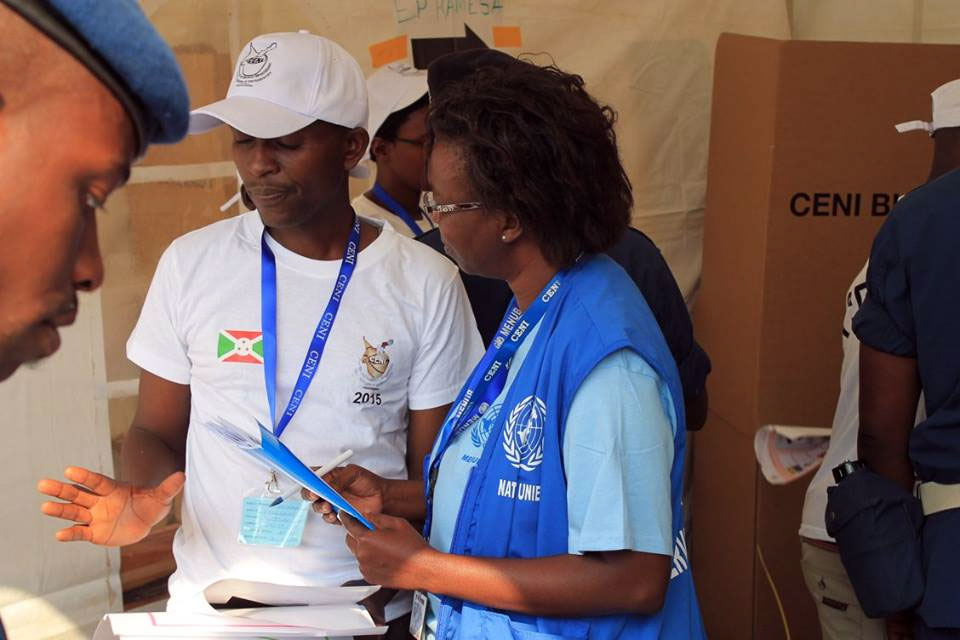
In accordance with its mandate, MENUB observes the electoral process in Burundi,
While the 21 July election in Burundi that won President Pierre Nkurunziza a controversial third term was relatively peaceful and conducted adequately, the overall environment was ‘not conducive’ for an inclusive, free and credible electoral process,” the United Nations Electoral Observation Mission in the country (MENUB) announced today.
This was the main conclusion of MENUB’s preliminary findings on the conduct of the presidential polls in Burundi, which took place after two postponements in an environment of “profound mistrust” between opposing political camps. The decision of the incumbent President to run for another term precipitated a deep political and socioeconomic crisis, the mission said.
“The Constitutional Court’s ruling on the admissibility of the President’s candidature for a third mandate did not solve the wider political problem of presidential term limits in Burundi, but rather exacerbated further controversy, protests and tensions,” the Mission explained in a statement issued today.
Freedoms of expression, assembly and association, essential conditions for the effective exercise of the right to vote, remained severely impaired. “Violence, although observed in a less intense degree than during the period preceding the 29 June [legislative and communal] elections, remained an unfortunate feature of the entire process.”
The various dialogue efforts, including the most recent initiative under the leadership of Ugandan President Yoweri Museveni and the East African Community (EAC), remained inconclusive, stated MENUB.
“Also, the parties did not reach agreement on a consensual electoral calendar. Nevertheless, on election day, Burundians in most places went peacefully to the polls to cast their ballots.”
Out of the eight presidential candidates, four declared that they would withdraw from the race. However, their names remained on the ballot, pointed out the Mission.
It also found that media freedom remained severely restricted. “Private and independent media outlets that were destroyed during the failed coup did not reopen, despite national and international appeals to the Burundian government to enable media to operate. State-owned media did not provide balanced media coverage to all presidential candidates.”
The Commission électorale nationale indépendante (CENI) conducted adequate logistical preparations for the presidential elections and polling activities in the observed polling sites largely followed procedures, the UN observers noted.
But tabulation at the observed municipal and provincial locations was carried out expeditiously, albeit in a disorganized manner, they said.
In conclusion, MENUB reiterated the Secretary-General’s call “for the cessation of all forms of violence respect of basic human rights and resumption of dialogue.”
FRENCH VERSION
Il s’agissait de la principale conclusion des résultats préliminairesde la MENUB sur le déroulement du scrutin présidentiel auBurundi, qui a eu lieu après deux ajournements dans unenvironnement de « profonde méfiance » entre les campspolitiques d’opposées. La décision du Président sortant debriguer un autre mandat a précipité une crise profonde politiqueet socioéconomique, la mission a déclaré.
« La décision de la Cour constitutionnelle sur la recevabilité duPrésident de candidature pour un troisième mandat n’a pasrésolu le problème politique plus large des limites de mandatprésidentiel au Burundi, mais plutôt exacerbé encorecontroverse, des protestations et des tensions, » la Mission a expliqué dans un communiqué publié aujourd’hui.
Libertés d’expression, de réunion et d’association, conditionsessentielles à l’exercice effectif du droit de vote, est restéegravement altérées. « Violence, bien qu’observées dans unemesure moins intense que pendant la période précédant lesélections [législatives et communales] 29 juin, demeure unecaractéristique malheureuse de l’ensemble du processus. »
Les divers efforts de dialogue, y compris la plus récente initiativesous la direction du Président ougandais Yoweri Museveni et del’Afrique orientale (CAO), est resté peu concluants, a déclaréMENUB.
“En outre, les parties n’atteignent pas accord sur un calendrierélectoral consensuel. Ceci dit, le jour du scrutin, burundais dansla plupart des endroits sont allés pacifiquement aux urnesd’exprimer leur suffrage. »
Sur les huit candidats à la présidence, quatre a déclaré qu’ilsseraient retireraient de la course. Cependant, leurs noms sont restés sur le bulletin de vote, a souligné la Mission.
Il a également été constaté que la liberté des médias est restéestrictement réglementée. “Les organes de presse privés etindépendants qui ont été détruits pendant le coup d’Étatmanqué n’a pas rouvert, malgré les appels nationaux etinternationaux au Gouvernement burundais pour permettre auxmédias à exploiter. Médias d’Etat n’a pas fourni une couverturemédiatique équilibrée à tous les candidats à la présidence.”
La Commission électorale nationale indépendante (CENI) a menédes préparatifs logistiques adéquates pour les électionsprésidentielles et activités du scrutin dans les bureaux observéssuit largement les procédures, les observateurs de l’ONU a noté.
Mais le tableau aux emplacements municipaux et provincesobservées a été réalisée dans les meilleurs délais, quoique demanière désorganisée, disaient-ils.
En conclusion, MENUB a réitéré l’appel du Secrétaire général « pour la cessation de toutes les formes de violence respect desdroits humains fondamentaux et de la reprise du dialogue.


